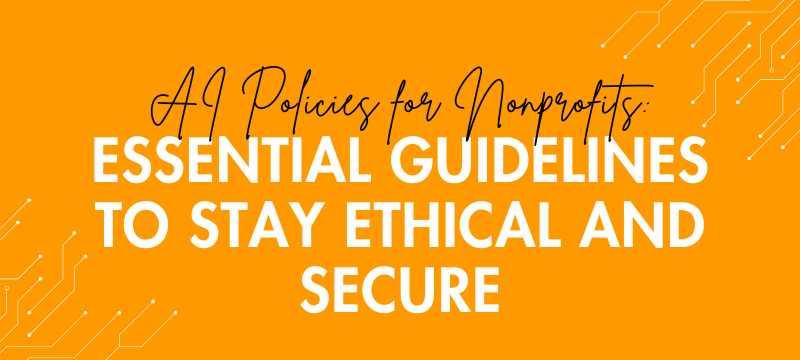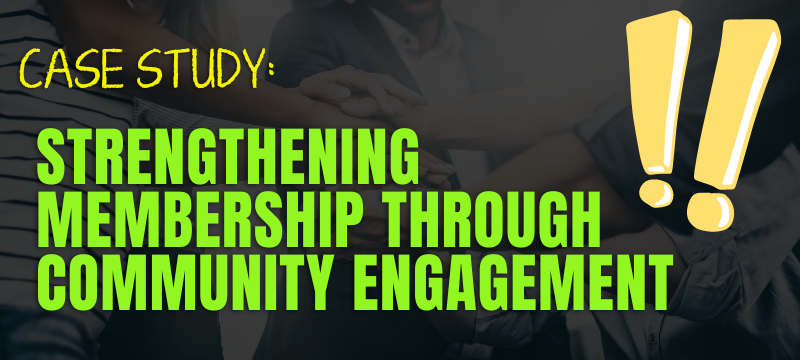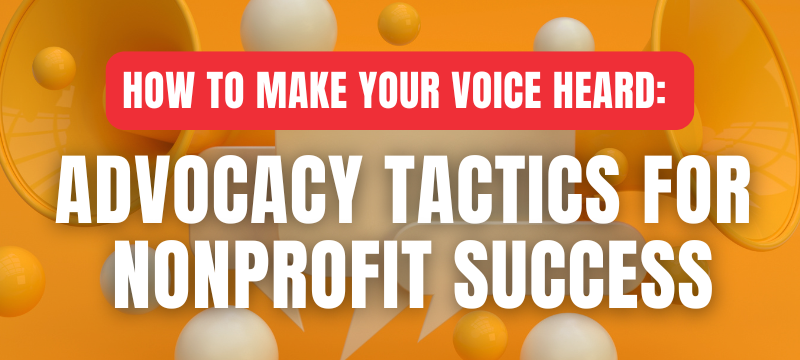Back in 2014, my husband, friends, clients, and I embarked on a heartwarming journey with…

AI Policies for Nonprofits: Essential Guidelines to Stay Ethical and Secure
AI is changing the way nonprofits operate, making everything from donor management to financial oversight more efficient. But with great power comes great responsibility. How can you ensure AI helps your nonprofit without creating unintended risks? Clear policies are the key. Without them, organizations risk ethical missteps, data security breaches, and reputational damage.
Here’s why AI policies matter for nonprofits and how to create ones that work.
1. Ethical AI Use and Decision-Making
AI is a game-changer, but it isn’t perfect. Many AI systems rely on algorithms that can introduce biases—sometimes in ways you might not expect. For example, if your AI-powered donor analytics favor certain demographics, are you unintentionally excluding key supporters? AI lacks human judgment, which means nonprofits need to set boundaries to keep decision-making aligned with their values.
Key policy considerations include:
- Transparency: Make it clear when and how AI is being used—whether in donor outreach, program evaluations, or automated responses.
- Bias and Fairness: Regularly review AI models to make sure they don’t unintentionally favor one group over another.
- Accountability: Assign a team or individual to oversee AI and make sure human oversight remains part of critical decisions.
2. Data Privacy and Security
AI thrives on data, but that data needs protection. Nonprofits often handle highly sensitive information—donor details, financial records, and even personal stories of beneficiaries. Without strict safeguards, AI-driven systems can increase the risk of data leaks, unauthorized access, or even manipulation.
Ask yourself: Who has access to your AI-generated insights? Are you complying with data protection laws? Do donors and clients know when AI is being used?
Key policy considerations include:
- Consent and Compliance: AI tools must align with privacy laws like GDPR or Canada’s PIPEDA.
- Data Retention and Deletion: AI-generated data should only be kept as long as necessary and securely deleted when no longer needed.
- Cybersecurity Measures: AI should help strengthen security, not create new risks. Encryption and multi-factor authentication should be required.
3. AI in Fundraising and Donor Engagement
AI is revolutionizing donor engagement by personalizing outreach and predicting giving patterns. But nonprofits must tread carefully. Does AI-generated communication feel authentic, or does it come across as robotic? Are AI-driven fundraising tactics ethical, or could they be seen as manipulative?
Key policy considerations include:
- Human Review of AI-Generated Messages: Ensure AI-crafted donor emails sound natural and align with your brand’s tone.
- Donor Consent: Allow donors to opt out of AI-personalized outreach.
- Ethical AI Use in Fundraising: Prevent AI from exaggerating impact or using misleading emotional appeals.
4. AI and Financial Management
AI is transforming nonprofit finance, from automating expense tracking to detecting fraud. But AI isn’t infallible. Without oversight, it can misinterpret anomalies, misclassify transactions, or generate financial projections that look precise but lack real-world context. As a CFO and financial management specialist, we can tell you firsthand—ChatGPT and other AI tools are not there yet when it comes to handling nonprofit finances. Numbers can be added incorrectly, formulas aren’t applied, and financial nuances are often missed. AI can analyze trends, but it can’t replace human judgment in financial decision-making.
Are you letting AI guide financial decisions without a human check?
Key policy considerations:
- Human Oversight: AI-generated financial reports should always be reviewed by finance teams before decisions are made. Never assume AI’s calculations are 100% accurate.
- Fraud Detection & Monitoring: AI tools must be tested regularly to ensure accuracy and avoid false fraud flags that could disrupt operations.
- AI in Grant Management: AI should assist, not replace, human-led grant applications and reporting—funding decisions require strategic thinking beyond data analysis.
AI can be a powerful tool, but when it comes to financial accuracy and strategic decision-making, human expertise is still irreplaceable.
5. Training and Staff Awareness
AI is only as effective as the people using it. Do your employees know how AI is being implemented in their work? Have they been trained on its risks? The more informed your team is, the better they’ll be at using AI responsibly and catching red flags.
Key policy considerations include:
- AI Literacy Training: Offer ongoing education on AI’s benefits, risks, and best practices.
- Human-in-the-Loop Approach: AI should assist, not replace, nonprofit professionals.
- Incident Response Plan: Have a plan in place for AI-related errors or breaches.
6. Governance and Continuous Evaluation
AI moves fast—your policies need to keep up. Nonprofits should regularly review how AI is being used and adapt policies as needed. Have you checked if your AI tools are still serving your mission? Are stakeholders comfortable with how AI is being used?
Take board meetings, for example. AI can now transcribe entire meetings, generate summaries, and even help draft minutes. Instead of someone spending hours typing everything up, AI can handle the bulk of the work in minutes. It can also assist in creating agendas by pulling in relevant topics from past discussions, making meeting prep easier than ever.
But here’s the catch—AI isn’t always “ON.” As useful as it is, it’s not 100% accurate. Think of AI as an intern: it gets you 60-70% of the way there, but the final 30% still needs human oversight. AI might miss important nuances in conversations, misinterpret key points, or even generate summaries that don’t quite align with the actual discussion. That’s why nonprofits need clear policies around AI governance.
Key policy considerations:
- Regular AI Audits: Assess AI tools annually to ensure they remain ethical, accurate, and effective.
- Board-Level Oversight: Assign a board member or create a committee to oversee AI governance and its implementation.
- Stakeholder Feedback: Give donors, staff, and beneficiaries a voice in AI-related decisions—especially if AI is handling communications or engagement.
AI can be a game-changer for nonprofit governance—but only if it’s used with intention and oversight. It can save time, but it can’t replace strategic human thinking.
Setting an Acceptable Use Policy for AI
AI can be a powerful tool, but nonprofits need clear boundaries on how it should (and shouldn’t) be used. An Acceptable Use Policy ensures that AI supports your mission ethically, securely, and transparently. For example, should AI-generated donor outreach always be reviewed by a human before sending? Can AI be used to analyze employee performance? What data is off-limits for AI processing?
Having a written policy helps staff understand when AI is appropriate, who is responsible for oversight, and how to ensure compliance with legal and ethical standards.
Example Policy:
- AI tools may assist in content creation but must be reviewed by a human before publishing.
- AI cannot be used to make final hiring or financial decisions without human oversight.
- Sensitive donor and financial data must not be processed through unapproved AI platforms.
If your nonprofit needs help creating an Acceptable Use Policy as part of your AI policies for nonprofits, reach out—we’re here to help!
Final Thoughts: Keeping AI Aligned with Your Mission
AI offers incredible opportunities for nonprofits—but only if used responsibly. A strong AI policy isn’t about restricting technology; it’s about making sure it works for your organization, your team, and the communities you serve.
Are you using AI in a way that aligns with your values? Do you have the right safeguards in place? Taking the time to build a thoughtful AI policy today will set you up for ethical and effective use in the future.
If your nonprofit is navigating AI implementation and needs guidance on developing AI policies for nonprofits, reach out—we’re here to help



